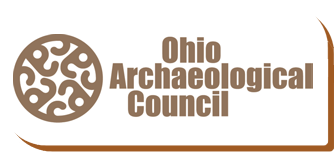Preamble
Archaeology provides an approach to the study of human behavior through the scientific investigation and interpretation of the archaeological record. A finite, nonrenewable, fragile resource, the archaeological record is comprised of all the material evidence of or related to past human behavior.
The scientific community and the people of Ohio have a claim on the information that can be derived from the study of Ohio's archaeological record. The Ohio Archaeological Council must therefore ensure that its members:
conduct their studies scientifically so that accurate new information about human behavior will be acquired;
disseminate the results of their studies;
help to conserve the archaeological record;
use archaeological resources economically in their research; and
conduct and communicate research with integrity, respect, fairness, trustworthiness, and transparency.
These objectives will be promoted by the promulgation of a code of ethics. The promulgation of this code, and the identification and unification of those who subscribe to it, will:
strengthen the identification of archaeology as a scientific discipline and of Ohio Archaeological Council members as professionally competent archaeologists,
encourage high standards in the training of archaeologists by Ohio Archaeological Council members,
require high standards of performance from Ohio Archaeological Council members,
communicate to the public the importance of the proper practice of archaeology, and
assist both governmental and private sector organizations in identifying Ohio Archaeological Council members qualified to meet their needs.
Code of Ethics
Archaeology is a scientific discipline, and the privilege of its practice requires professional morality, responsibility, and competence on the part of each practitioner.
I. The Ohio Archaeological Council Member's Responsibility to the Public
1.1 An Ohio Archaeological Council member shall:
Be committed to represent archaeology and its research results to the Public in a responsible manner;
Actively support conservation of the archaeological resource base;
Be sensitive to, and respect the legitimate concerns of, groups whose cultural histories are the subjects of archaeological investigations;
Avoid and discourage exaggerated, misleading, or unwarranted statements about archaeological matters that might induce others to engage in unethical or illegal activity;
Support and comply with the terms of the UNESCO Convention on the means of prohibiting and preventing the illicit import, export, and transfer of ownership of cultural property, as adopted by the General Conference, 14 November 1970, Paris;
Insure adequate curatorial facilities.
1.2 An Ohio Archaeological Council member shall not:
Buy, sell, or trade archaeological resources (as defined in Section 1215.3 of the Archaeological Resources Protection Act of 1979) for personal gain;
Engage in any illegal or unethical conduct involving archaeological matters or knowingly permit the use of his/her name in support of such activities;
Give a professional opinion, make a public report, or give legal testimony involving archaeological matters without being as thoroughly informed as might reasonably be expected;
Engage in conduct involving dishonesty, fraud, deceit, or misrepresentation about archaeological matters;
Undertake any research that affects the archaeological resource base for which he/she is not qualified.
II: The Ohio Archaeological Council Member's Responsibility to His/Her Colleagues
2.1 An Ohio Archaeological Council member shall:
Give appropriate credit for work done by others;
Stay informed and knowledgeable about developments in his/her field or fields of specialization;
Accurately, and without undue delay, prepare and properly disseminate a description of research done and its results;
Communicate and cooperate with colleagues having common professional interests;
Give due respect to colleagues' interests in, and rights to, information about archaeological resources, areas, collections, or data where there is a mutual active or potentially active research concern;
Take responsibility for creating and upholding a safe, open, and professional environment for learning, conducting, and communicating science with integrity, respect, fairness, trustworthiness, and transparency; and
Report knowledge of violations of the Code of Ethics to the Ohio Archaeological Council's Board of Trustees that will act in accordance with the Council's Code of Regulations.
2.2 An Ohio Archaeological Council member shall not:
Falsely or maliciously attempt to injure the reputation of another Ohio Archaeological Council member;
Commit plagiarism in oral or written communication;
Undertake research that affects the archaeological resource base unless reasonably prompt and appropriate analysis, curation, and reporting can be expected;
Refuse a reasonable request from a qualified colleague for research data;
Submit false or misleading application for membership in or certification by the Ohio Archaeological Council; or
Engage in discrimination or harassment based on ethnic or national origin, race, religion, citizenship, language, political or other opinion, sex, gender identity, sexual orientation, disability, physical appearance, age, or economic class.
III. The Ohio Archaeological Council Member's Responsibility to His/Her Employers and Clients
3.1 An Ohio Archaeological Council member shall:
Comply with the interests of his/her employer or client, so far as is consistent with this Code;
Recommend to employers or clients the employment of other archaeologists or other expert consultants upon encountering archaeological problems beyond his/her own competence;
Exercise reasonable care to prevent his/her employees, colleagues, associates, and others whose services are utilized by him/her, from revealing or using confidential information. Confidential information means information of a non-archaeological nature gained in the course of employment which the employer or client has requested be held inviolate, or the disclosure of which would be embarrassing or would be likely to be detrimental to the employer or client, unless there is a question of a violation of law. Information ceases to be confidential when the employer or client so indicates or when such information becomes publicly known.
3.2 An Ohio Archaeological Council member shall not:
1. Reveal confidential information, unless required by law;
2. Use confidential information to the disadvantage of the client or employer;
3. Use confidential information for the advantage of himself/herself or a third person, unless the client consents after full disclosure;
4. Accept compensation or anything of value for recommending the employment of another Ohio Archaeological Council member or other person.
5. Violate the provisions of the Council's Policies and Procedures Concerning the Excavation and Disposition of Human Remains, approved in November 1983.
- Adopted 02/02/2018
